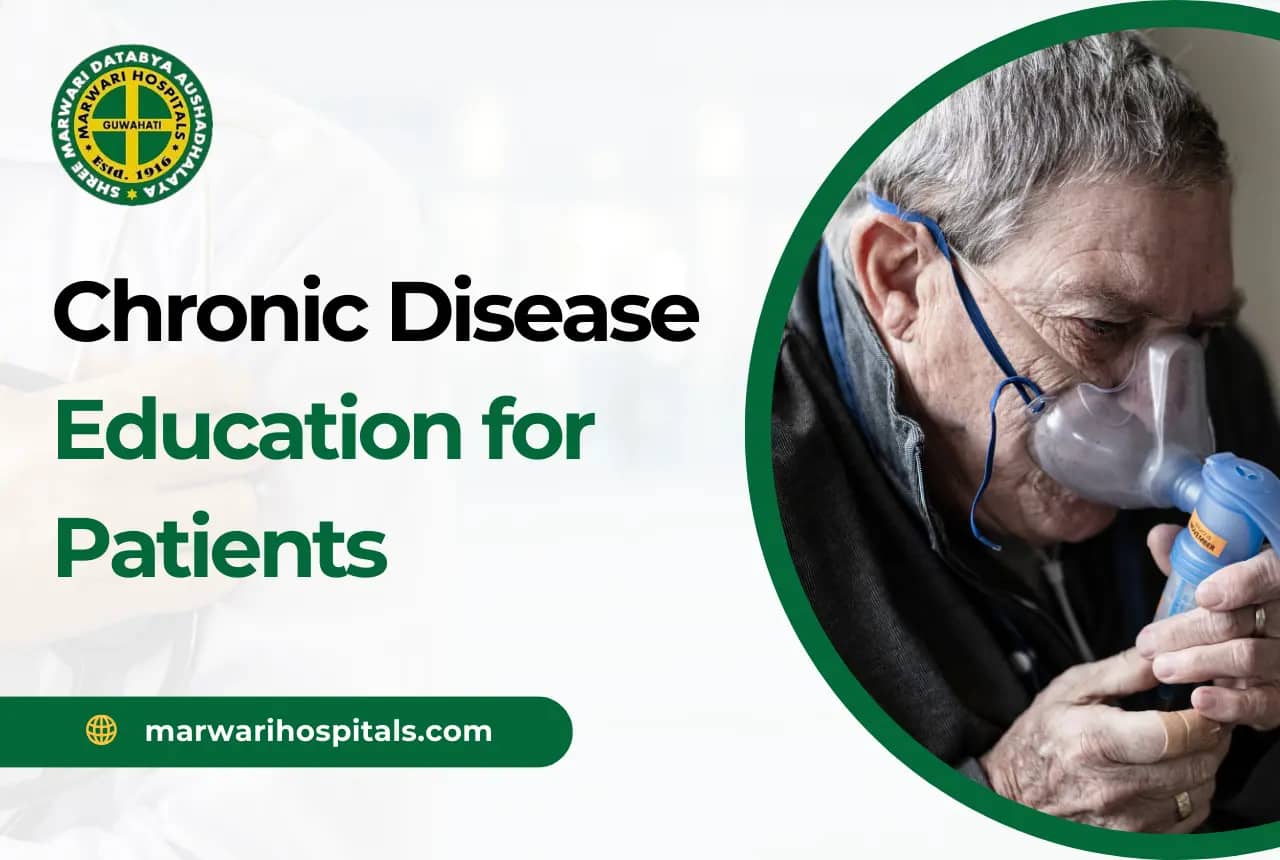Chronic disease is described as a condition that lasts a year or longer and demands lasting medical care. It frequently restricts an individual’s daily activities or functions. These conditions are extremely common worldwide. According to the World Health Organization (WHO), chronic diseases are the largest cause of death in the world, accounting for more than 70% of all deaths. Therefore chronic disease education for patients it is necessary to understand and maintain a healthy life.
People need chronic disease education to understand and manage their health. This instruction covers illness causes, symptoms, risks, and complications. Patients also learn self-management measures including eating a balanced diet, exercising frequently, managing stress, taking medications as prescribed, and adopting symptom control methods.
Chronic disease education also teaches people how to communicate with doctors, ask questions, and voice concerns. Such education gives patients the skills and confidence to manage their diseases independently, improving self-management and increasing control and well-being. Informed people are more likely to follow treatment programs, which improve health by reducing problems and improving health.
Good chronic disease education reduces hospitalizations, emergency department visits, and prescription misuse, saving individuals and healthcare systems money. Customized chronic illness education programs for diabetes and cardiovascular disease are widely available to assist people make educated decisions and managing their health.
Understand Your Chronic Disease

Chronic diseases refer to a wide range of long-term illnesses that affect millions of people worldwide. Some typical categories are:
- Cardiovascular disease (CVD): This term refers to disorders that affect the heart and blood arteries, including heart attacks, strokes, and high blood pressure.
- Respiratory diseases: Chronic obstructive pulmonary disease (COPD) and asthma are two respiratory illnesses that cause difficulty breathing and impaired lung function.
- Diabetes: Diabetes is the body’s inability to adequately regulate blood sugar levels, which can lead to consequences such as heart disease and visual loss.
- Cancer: Cancer is defined as the uncontrolled proliferation of abnormal cells, which frequently necessitates a combination of therapies such as surgery, radiation, and chemotherapy.
- Mental health conditions: Mental health problems such as depression, anxiety, and bipolar disorder have a profound impact on daily life and emotional well-being.
Each type has its own set of causes and risk factors. While genetics can play a role in some situations, lifestyle and environmental factors are frequently substantial contributors to the development of chronic diseases. These factors include:
- Unhealthy diet: An unhealthy diet includes an excessive intake of saturated and trans fats, sugar, and salt, as well as an insufficient intake of fruits, vegetables, and whole grains, which increases the risk of a variety of chronic diseases.
- Physical inactivity: A sedentary lifestyle is a key risk factor for a variety of chronic diseases, including CVD, diabetes, and obesity.
- Tobacco: Tobacco use and exposure to secondhand smoke raise the risk of lung cancer, heart disease, and other chronic diseases.
- Alcohol consumption: Excessive alcohol use can lead to liver damage, heart problems, and several malignancies.
- Environmental factors: Air pollution, pollutants, and a lack of access to good dietary options can all contribute to the development of chronic diseases.
Nutrition education and chronic illness prevention are essential for reducing chronic disease worldwide. A balanced diet rich in fruits, vegetables, whole grains, and lean protein and low in bad fats, added sweets, and salt can considerably reduce risk factors. Furthermore, frequent physical activity and maintaining a healthy weight are essential for avoiding chronic diseases.
Pillars of Chronic Disease Education for Patients

Chronic disease education teaches you how to take control of your health and manage your condition efficiently. This section digs into the essential pillars of this education, equipping you with the knowledge and abilities you’ll need to navigate your path to wellness.
Understanding your specific condition is important. This includes:
- Symptoms: Recognizing early indicators and potential problems allows you to seek fast medical assistance.
- Progression: Understanding how the disease progresses allows you to anticipate possible changes and plan for the future.
- problems: Understanding potential problems allows you to collaborate with your healthcare team to reduce risks.
Learning styles vary, and several resources cater to different preferences:
- Printed materials: Brochures and booklets include concise information.
- Online modules: Interactive platforms offer structured learning options.
- Videos: Educational videos can be both interesting and visually informative.
- Consultations: Healthcare specialists can answer questions and provide information tailored to your individual needs.
Chronic disease education for older acknowledges constraints. Voice recordings, large print materials, and family facilitators can improve accessibility and accommodate chosen learning methods.
Treatment and Self-Management Skills

Effective self-management necessitates acquiring fundamental skills:
Medication adherence
Taking drugs exactly as prescribed is critical for controlling your disease. Use prescription reminders and pill organizers, and share any issues with your doctor.l
Healthy Lifestyle Practices
- Diet: Planning your meals according to your healthcare provider’s advice might help you make healthier choices. The American Heart Association, for example, offers advice on a variety of dietary demands.
- Exercise: Regular physical activity, even in small amounts, can have a major impact on your health. Explore fitness options that are appropriate for your ability, and seek tailored advice from a healthcare practitioner.
- Stress management: Deep breathing, meditation, and yoga can all help you manage stress, which is a major component in chronic diseases. Several apps and online sites provide guided practices.
- Regular monitoring: Tracking vital signs (e.g., blood pressure, blood sugar levels) and doing self-assessments can help you and your healthcare team track your progress and spot potential problems early on.
Chronic disease education for obesity emphasizes portion control, mindful eating, and sustainable physical activity. An accredited nutritionist and personal trainer can offer customized guidance.
Communication and Support

Open communication with your healthcare providers promotes a collaborative approach to treating your disease. Ask questions, voice your concerns, and actively participate in discussions about your treatment plan.
Connecting with others who face similar issues can be quite beneficial. Joining in-person or online support groups offers emotional support, develops a feeling of community, and facilitates knowledge sharing.
Put Your Knowledge into Action
Having information is merely the beginning. Putting it into action necessitates a customized plan and tactics for overcoming obstacles.
Create an action plan that is SMART (specific, measurable, attainable, relevant, and time-bound) and tailored to your individual requirements and goals. Break down major goals into smaller, more doable tasks to guarantee steady development.
- Set SMART goals: “I will walk for 30 minutes three times per week by next month” is a SMART goal, while “I will exercise more” is not.
- Overcome challenges: Everyone experiences hurdles. Recognize potential challenges (such as a lack of desire or time limits) and devise solutions to overcome them. Find appropriate coping methods and seek help from your healthcare team or support groups as needed.
- Stay motivated. Celebrate your accomplishments, no matter how minor. Reward yourself for reaching milestones and focus on how treating your disease improves your life.
- Self-advocacy: Take an active role in your healthcare journey. Ask questions, express concerns, and don’t be afraid to request additional clarification if necessary.
Resources & Tools for Continuing Learning
There are numerous tools available to support your continued learning and self-management journey.
- Disease-specific websites: Many organizations provide credible information and tools on certain chronic diseases. Look for websites that use trusted sources, such as government agencies or recognized medical schools.
- Apps: Downloadable apps can offer a variety of features, including medicine reminders and healthy food suggestions, as well as mindfulness activities and progress tracking.
- Support groups: Attending support groups, whether in person or online, allows you to interact with people who are facing similar issues. These clubs offer emotional support, practical advice, and a sense of community.
Chronic disease education for healthcare professionals stresses lifelong learning and patient-centered communication. Keeping up with new discoveries and communicating with patients helps doctors give the best care.
Summing it up:
Education on chronic diseases helps you to manage your health. Take control and improve your health by understanding your condition, learning self-management skills, and using resources. You have company on this adventure. Let your healthcare team, family, friends, and support groups help. With education, effort, and a positive outlook, you may live a meaningful and healthy life with a chronic condition.

